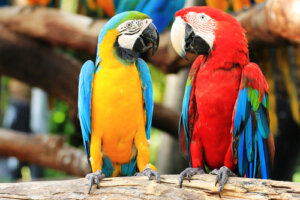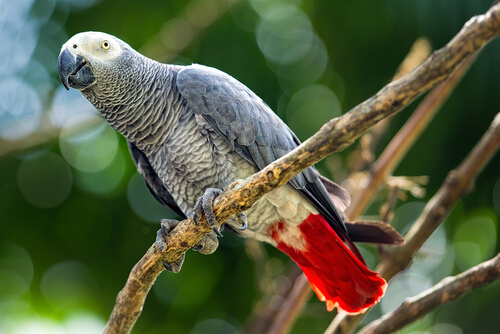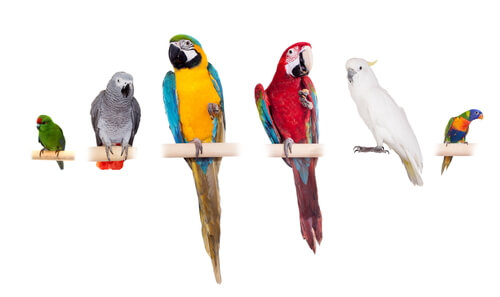Why Parrots Are Funny Companions

The friendly and outgoing character of parrots makes them one of the most sought-after animals as pets. In addition, the fact that they can learn to speak and that their reproduction isn’t complicated makes them especially attractive. All of this makes parrots really funny companions and great company.
Funny companions: before you adopt one
Before deciding on a parrot as a pet, keep in mind that it’s a very long-lived bird. Unlike other pets, such as hamsters, rabbits, dogs, or cats, parrots can live between 50 and 60 years, so the owner must be willing to share a large part of their life with this bird.
This has its advantages and disadvantages. The main advantage is that the parrot is very unlikely to die before its owner or when children are young, thus avoiding the sadness that inevitably follows the death of a companion animal.
Parrots are lively and active animals that need almost permanent attention and an entertaining environment in order to expend their energy and satisfy their curiosity. Therefore, if the pet is expected to spend most of the day alone, it’s better to decide on one that requires less attention.
If a parrot doesn’t receive all the attention it needs, it can develop pathologies such as anxiety, stress, or destructive behavior. It must be borne in mind that parrots that are alone in their cage, create stronger emotional bonds with their owners than if they have a partner.
What cage should I select for my parrot?
Choosing a suitable cage is one of the most important aspects of its care. A parrot needs a wide space to be able to move with some ease and to allow it to fully extend its wings. Also, the tail mustn’t touch the ground when resting on the perch. Unfortunately, the cages sold in pet stores are too small in size and the parrot isn’t comfortable in them.
In addition, the cage must be made of resistant materials that aren’t toxic and mustn’t have holes and open spaces where the parrot can harm itself. The underside should be covered with newspaper to prevent parasites from developing and should be designed in such a way that the bird can’t access its own droppings.
Likewise, the cage must have at least two perches whose diameter must correspond to that of the parrot’s leg. Smooth wooden and plastic perches are highly inconvenient, as they prevent natural wear on the nails and help to develop leg diseases. For this reason, they must be rough and also must be placed in such a way that the bird can’t dirty the feeder and the drinker with excrement.
Regarding its location, the cage should be located in a place with abundant light and ventilation. In addition, it must be placed so that when the parrot perches on one of the perches, it’s at the level of the owner’s eyes, because if the parrot is a lot lower than its owners, it may feel intimidated and may generate aggressive tendencies.
What toys does my parrot need?
As we’ve already said, parrots, as well as being funny companions, are very restless and curious animals that need activity so as not to get bored. Therefore, they need toys. The most common ones are bells, wooden ladders, swings, or ropes. In order not to fill the cage too much with objects and prevent the parrot’s mobility, the ideal thing is to change them from time to time. In addition, in this way, you stimulate the bird’s creativity.
You need to be very careful with parrot toys, because most of the accessories that are sold in stores, pose considerable danger. Chains with excessively large links and bells with detachable clappers are especially dangerous because they run the risk of being swallowed.
The best toys for parrots are ones that are made with natural materials and that have a size that’s proportional to the age of the bird. It’s also best that they can’t be disassembled, so that the parrot doesn’t ingest them.
The friendly and outgoing character of parrots makes them one of the most sought-after animals as pets. In addition, the fact that they can learn to speak and that their reproduction isn’t complicated makes them especially attractive. All of this makes parrots really funny companions and great company.
Funny companions: before you adopt one
Before deciding on a parrot as a pet, keep in mind that it’s a very long-lived bird. Unlike other pets, such as hamsters, rabbits, dogs, or cats, parrots can live between 50 and 60 years, so the owner must be willing to share a large part of their life with this bird.
This has its advantages and disadvantages. The main advantage is that the parrot is very unlikely to die before its owner or when children are young, thus avoiding the sadness that inevitably follows the death of a companion animal.
Parrots are lively and active animals that need almost permanent attention and an entertaining environment in order to expend their energy and satisfy their curiosity. Therefore, if the pet is expected to spend most of the day alone, it’s better to decide on one that requires less attention.
If a parrot doesn’t receive all the attention it needs, it can develop pathologies such as anxiety, stress, or destructive behavior. It must be borne in mind that parrots that are alone in their cage, create stronger emotional bonds with their owners than if they have a partner.
What cage should I select for my parrot?
Choosing a suitable cage is one of the most important aspects of its care. A parrot needs a wide space to be able to move with some ease and to allow it to fully extend its wings. Also, the tail mustn’t touch the ground when resting on the perch. Unfortunately, the cages sold in pet stores are too small in size and the parrot isn’t comfortable in them.
In addition, the cage must be made of resistant materials that aren’t toxic and mustn’t have holes and open spaces where the parrot can harm itself. The underside should be covered with newspaper to prevent parasites from developing and should be designed in such a way that the bird can’t access its own droppings.
Likewise, the cage must have at least two perches whose diameter must correspond to that of the parrot’s leg. Smooth wooden and plastic perches are highly inconvenient, as they prevent natural wear on the nails and help to develop leg diseases. For this reason, they must be rough and also must be placed in such a way that the bird can’t dirty the feeder and the drinker with excrement.
Regarding its location, the cage should be located in a place with abundant light and ventilation. In addition, it must be placed so that when the parrot perches on one of the perches, it’s at the level of the owner’s eyes, because if the parrot is a lot lower than its owners, it may feel intimidated and may generate aggressive tendencies.
What toys does my parrot need?
As we’ve already said, parrots, as well as being funny companions, are very restless and curious animals that need activity so as not to get bored. Therefore, they need toys. The most common ones are bells, wooden ladders, swings, or ropes. In order not to fill the cage too much with objects and prevent the parrot’s mobility, the ideal thing is to change them from time to time. In addition, in this way, you stimulate the bird’s creativity.
You need to be very careful with parrot toys, because most of the accessories that are sold in stores, pose considerable danger. Chains with excessively large links and bells with detachable clappers are especially dangerous because they run the risk of being swallowed.
The best toys for parrots are ones that are made with natural materials and that have a size that’s proportional to the age of the bird. It’s also best that they can’t be disassembled, so that the parrot doesn’t ingest them.
This text is provided for informational purposes only and does not replace consultation with a professional. If in doubt, consult your specialist.










